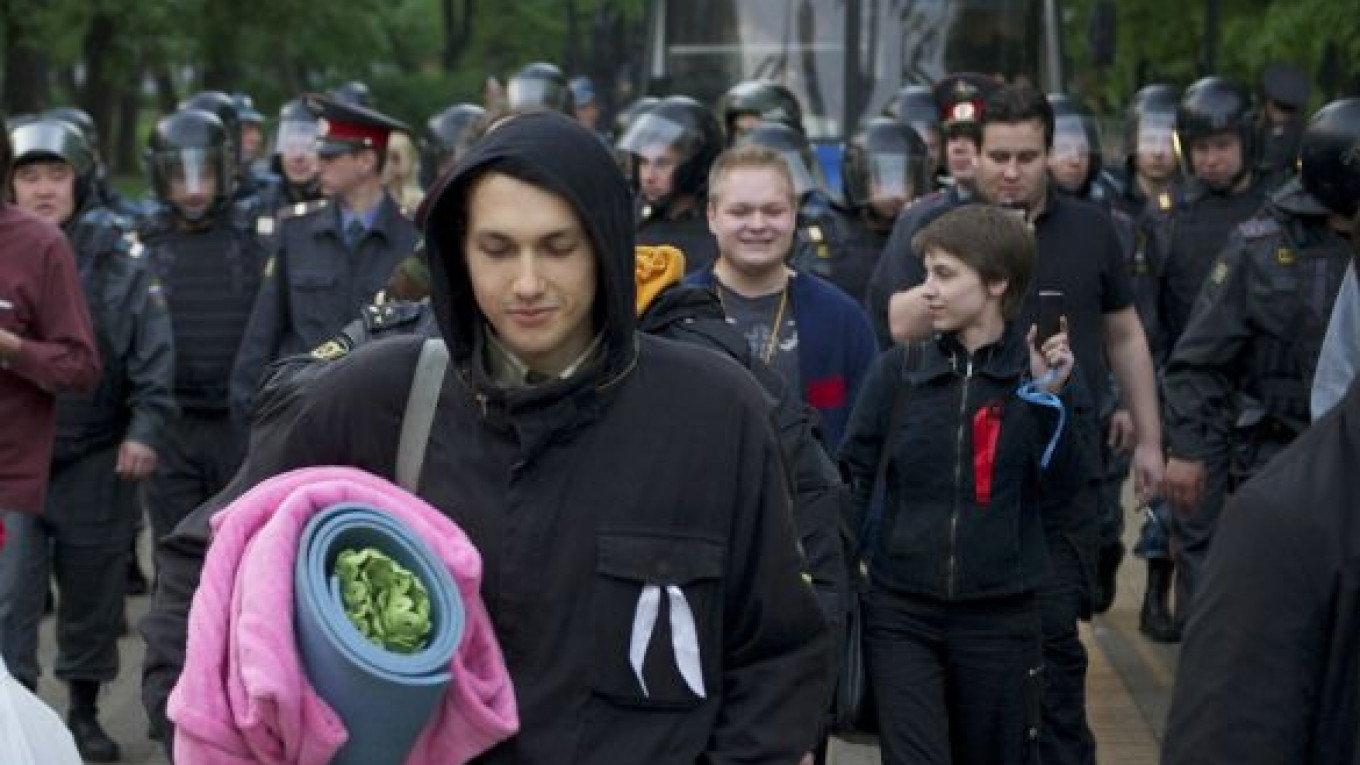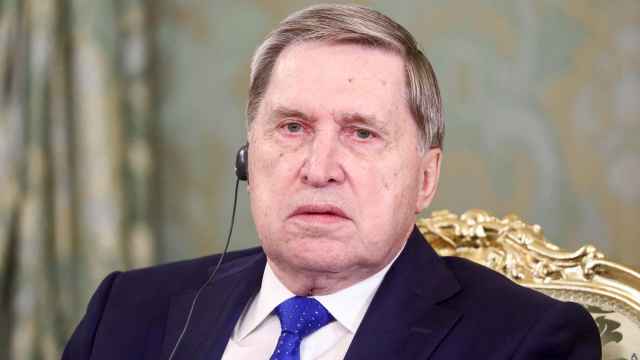After days of speculation, riot police swooped in and dismantled the opposition's Occupy-style encampment in a central Moscow park early Wednesday morning, detaining more than 20 exhausted activists and hustling the others into a nearby metro station.
But opposition activists vowed to continue the fight for reform and quickly began pooling at Kudrinskaya Ploshchad, near the Barrikadnaya metro station, where a makeshift kitchen and security patrols were established by the afternoon. Several hundred had gathered there by early evening.
The move comes as opposition mounts to a State Duma bill that would vastly increase penalties for illegal protests. and a group led by former Finance Minister Alexei Kudrin both came out against what they described as a draconian measure on Wednesday.
United Russia deputies said the new rules are necessary to prevent a repeat of the May 6 protest, which was marred by violence, and that they could add amendments to ban past offenders from organizing rallies and participants from wearing masks.
President Vladimir Putin's return to the presidency has sparked the largest protests since early March. In addition to the May 6 rally, activists have staged several mass "strolls," in an act of defiance after police detained hundreds of pedestrians early last week.
Two of those detained, opposition leaders Sergei Udaltsov and Alexei Navalny, are currently serving 15-day prison sentences in connection with the unrest.
Udaltsov, who is on a hunger strike, is currently in "critical" condition and requires urgent medical care, veteran human rights activist Lev Ponomaryov told Ekho Moskvy radio. He urged Udaltsov to end the strike and prison officials to hospitalize him or else "bear the responsibility."
Free assembly advocates led by radical writer Eduard Limonov announced on Wednesday that they would rally on May 31 on Triumfalnaya Ploshchad, continuing a periodic protest aimed at defending Article 31 of the Constitution, which allows free assembly.
Those rallies — which have never been sanctioned by City Hall — have historically ended in detentions.
State Duma deputies from the ruling United Russia party are moving quickly to raise fines for illegal demonstrations and have threatened to enact other measures.
A bill that would increase fines from up to 2,000 rubles ($65) to up to 1 million rubles ($32,368) for protesters and from up to 5,000 rubles to up to 1.5 million rubles for organizers passed committee level along party lines and will be introduced for a first reading on Friday.
The bill's author, United Russia's Alexander Sidyakin, has said he hopes that bill will be in force by the June 12 Russia Day holiday, when the opposition plans to hold its next large-scale rally.
On Wednesday, the Committee for Civil Activism, a group of moderate public intellectuals headed by Kudrin, said in a statement on Facebook that the measures were designed to "scare people" and force them to "reject social activism at any cost."
The Public Chamber, meanwhile, wrote in an analysis of the bill sent to Duma Chairman Sergei Naryshkin on Wednesday that the text "violates the principle of proportionate punishment."
The bill's authors "don't take into account the average salary of demonstrators," the Public Chamber said in a statement posted on its website.
Wednesday's clearing of Chistiye Prudy put activists on the move and came as a surprise to some at the encampment, who thought they had until noon to leave as per an agreement with police brokered by Ilya Yashin on Tuesday after the Basmanny District Court ordered police to close the camp down following complaints by locals.
Andrei Prokofyev, 43, told The Moscow Times that many of the estimated 200 activists abandoned their sleeping mats and blankets in the rush to leave, with some accidentally leaving passports behind. The detentions occurred when some protesters resisted being corralled into the nearby Chistiye Prudy metro station, he said.
In a court hearing on Tuesday, a city official said protesters had inflicted about 20.4 million rubles ($671,000) in damage to the lawns in the park.
Protesters said they had made an effort to keep the site clean, and Interfax reported that it took workers no more than 20 minutes to pick up the garbage and belongings left behind.
A Message from The Moscow Times:
Dear readers,
We are facing unprecedented challenges. Russia's Prosecutor General's Office has designated The Moscow Times as an "undesirable" organization, criminalizing our work and putting our staff at risk of prosecution. This follows our earlier unjust labeling as a "foreign agent."
These actions are direct attempts to silence independent journalism in Russia. The authorities claim our work "discredits the decisions of the Russian leadership." We see things differently: we strive to provide accurate, unbiased reporting on Russia.
We, the journalists of The Moscow Times, refuse to be silenced. But to continue our work, we need your help.
Your support, no matter how small, makes a world of difference. If you can, please support us monthly starting from just $2. It's quick to set up, and every contribution makes a significant impact.
By supporting The Moscow Times, you're defending open, independent journalism in the face of repression. Thank you for standing with us.
Remind me later.






